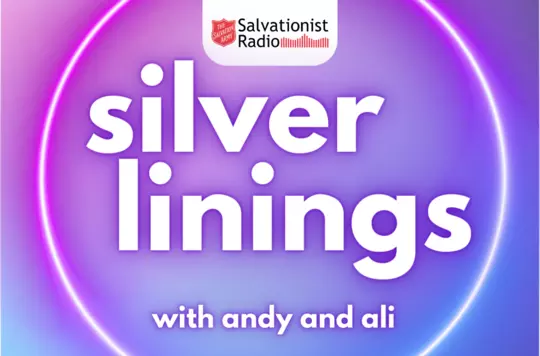30 September 2023
A good shepherd: God is faithful!
Captain Chris Kelly
Captain Chris Kelly reminds us of God’s faithfulness despite our sinfulness.
Key text
Whenever I hear the word ‘faithfulness’, immediately, I am taken back to my grandma’s living room and remember her sitting in her chair singing ‘Great Is Thy Faithfulness’ (SASB 26). Without a single doubt in her mind of the faithfulness of her Saviour, she sang as she wrote her weekly letters.
Every Sunday afternoon was a quiet time when she wrote to other people. On one occasion, I remember being really bored. I whinged: ‘But Grandma, what’s the point?’ Her silence was enough to silence me.
Pause and reflect
- Do you ever ask yourself ‘What is the point’?
Perhaps that question reminds you of the beginning of our study passage: ‘What advantage, then, is there in being a Jew, or what value is there in circumcision?’ (v1).
Paul ends the previous chapter of his letter to the Romans by outlining the difference between an outward sign and an inner experience: ‘A person is a Jew who is one inwardly; and circumcision is circumcision of the heart, by the Spirit, not by the written code’ (2:29).
Looking at everything Paul says in chapter 2 and then this opening statement of chapter 3, he could be accused of disregarding a practice that God had established: circumcision. If that is the case, then what is the point in being a Jew?
Paul reminds his readers that, as God’s chosen people, they were ‘entrusted with the very words of God’ (v2). They had knowledge that others did not. Yet, despite this advantage, they failed to make use of it, therefore it did them no good at all. They were no better off than if they had never known the Law because they did not put it to its intended use.
During the time of Moses, God gave his Law to his chosen people, Israel. As the Israelites were about to cross the River Jordan and enter the Promised Land, Moses reminded them: ‘He declared to you his covenant, the Ten Commandments, which he commanded you to follow and then wrote them on two stone tablets’ (Deuteronomy 4:13).
Pause and reflect
- What parallels do you see with our society today?
- Are there times when we might be the ones who don’t put the word of God to good use?
Very early in our study passage, Paul reminds us of God’s faithfulness. We see the contrast between that and the lack of faithfulness of God’s people.
It could be said that the people Paul is writing to are more than happy to focus on the minutiae while missing the big picture. They readily focus on an outward sign rather than recognise how far they fall short in their obedience to God’s commandments.
It recalls Jesus’ strong words for the ‘righteous’ who focused on the wrong things. He addressed the religious leaders of his day – the teachers of the Law and the Pharisees – and said: ‘You blind guides! You strain out a gnat but swallow a camel’ (Matthew 23:24).
In verse 3 of his letter, Paul asks: ‘Will their unfaithfulness nullify God’s faithfulness?’ In verse 5, he continues: ‘If our unrighteousness brings out God’s righteousness more clearly, what shall we say? That God is unjust in bringing his wrath on us?’ (v5).
Whether Jew or Gentile, before a holy God whose Law we fail to keep, Paul concludes that we are ‘all under the power of sin’ (v9).
In verses 10 to 18, Paul quotes verses from Psalms and Ecclesiastes to demonstrate our sinfulness and justify his earlier comments. For example: ‘All have turned away, all have become corrupt; there is no one who does good, not even one’ (Psalm 14:3).
Paul, however, uses the word ‘righteous’ (v10) rather than ‘good’. Perhaps this is to emphasise the fact that not one of us can stand before God, except by God’s faithfulness and grace.
Paul’s references describe harmful speech and evil actions of people – their tongues practise deceit, with poison on their lips, mouths full of cursing and bitterness that are swift to shed blood, and ruin and misery mark their ways. Such people neither know the way of peace nor live their lives in fear of the Lord (see vv17 and 18).
Pause and reflect
- Are you ever worried that you’ve let God down so much that his faithfulness will be withdrawn?
If this is the case, maybe we need to be reminded of God’s faithfulness. As General John Gowans writes: ‘For his love remains the same,/ He knows you by your name,/ Don’t think because you failed him he despairs;/ For he gives to those who ask/ His grace for every task,/ God plans for you in love for he still cares’ (SASB 490).
Pause and reflect
- What personal message do you need to hear from God?
- In the face of our many failures, what difference does a clear understanding of God’s grace and faithfulness make to us?
In the final verse of our study passage, Paul writes: ‘Therefore no one will be declared righteous in God’s sight by the works of the Law; rather, through the Law we become conscious of our sin.’
In John 15 and 16, Jesus explained the role of the Holy Spirit to his disciples. He was sent to prompt us and point out the things in our lives that don’t sit well with God and are not beneficial for us. Jesus calls him the ‘Spirit of truth’ (15:26).
From time to time, we need reminding that this correction by God is a loving gesture of his faithfulness. He seeks to direct us carefully back into the fold as any good shepherd does for his flock.
Bible study by

Captain Chris Kelly
Corps Officer, Middlesbrough Citadel
Discover more

This leaflet answers some of the basic questions about Jesus - his place in history, his life, teaching, example, death, resurrection and Spirit in the world today.

Major Cliff Allchin considers God’s solution for people who have sinned against him.

Andy reflects on the seasons and God's creation in this episode of the Silver Linings podcast.

